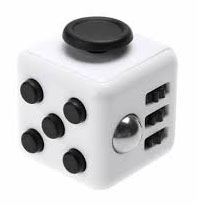Ebony Baker is an intern in the mental health department at Bedfordshire Police. Her main project has been designing and implementing a study into the effectiveness of fidget cubes when interviewing autistic subjects
The idea of using fidget cubes to help autistic interviewees was presented to the Force autism champions in September 2018 – they suggested that the use of fidget toys in a custody and interview setting may benefit those with Autistic Spectrum Condition (ASC). I could see the idea had great potential and decided to take it on as a project, which led to me designing and implementing the Fidget Cube Pilot Study, currently running in Kempston and Luton Custody Suites.

Setting up the pilot study and gaining approval from the correct people was a lengthy process but a worthwhile one. The pilot study is being used in three different settings: as well as Custody it has been implemented in ERSOU Cyber Prevent and Bedfordshire Cyber Crime. Across the three units the types of interviews vary from voluntary and home interviews to interviews in Custody.
I am delighted to say that so far the pilot study has received a really positive reaction from staff and officers within the Force, and has sparked conversations regarding Autism Spectrum Condition.
“Yesterday I gave a young prisoner a fidget cube. He was tense and aggressive and nervous. But when I offered the cube he looked visibly relieved and immediately calmed down. It was a like a switch. He clicked it through the interview and became cooperative. I’ve never seen anything like it. He is being assessed for autism and ADHD but isn’t officially diagnosed. His care home are going to buy some now.”
Police officer testimonial
What we are seeing is a reduction in visual signs of stress and anxiety in the autistic interviewees. Some individuals have said that the fidget cube helped them focus on the interview and think more clearly. Individuals also reported feeling less agitated and said that the fidget cube was successful at keeping them calm.
One appropriate adult even said that they were going to proceed to buy some fidget cubes for their home where the interviewee is cared for. Mothers of two interviewees have also described the pilot study as a ‘good idea’ and ‘excellent’.
It has been great to see this project has made a positive difference to a number of autistic individuals who have come in to contact with the police, as well as continuing to raise awareness around Autism Spectrum Disorder within the Force. ∎
This blog was originally published on the Hertfordshire Constabulary intranet – it is reproduced here with kind permission of the author
